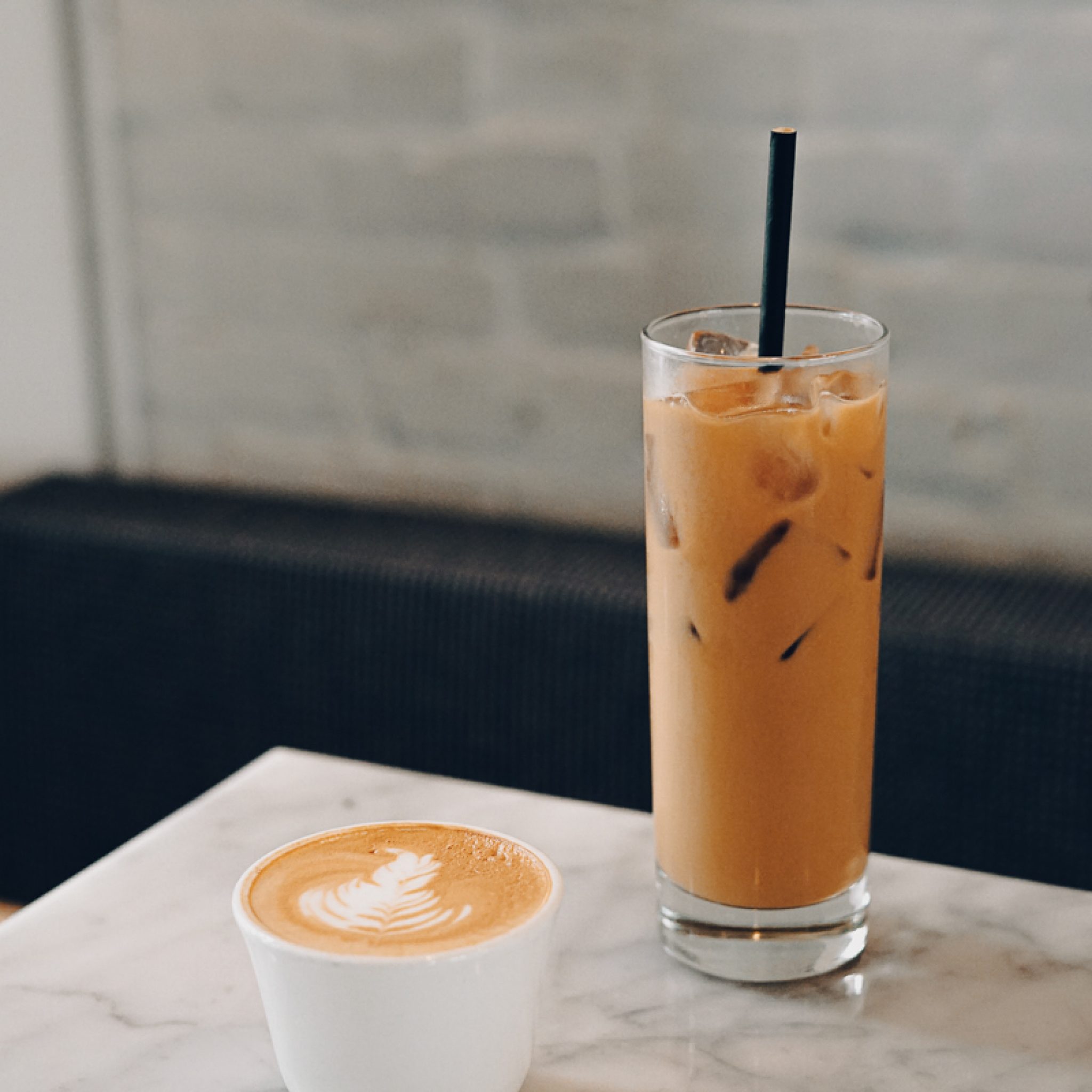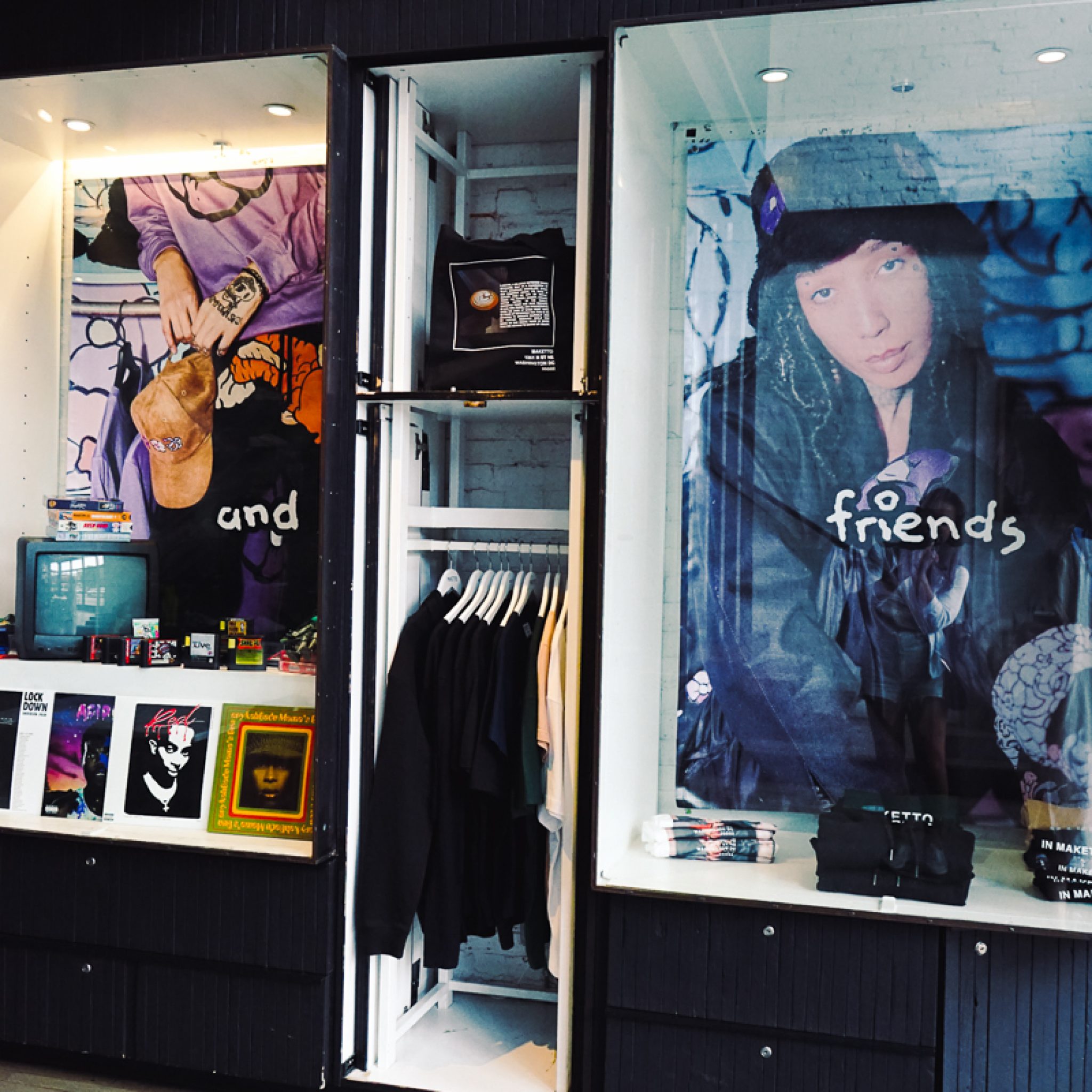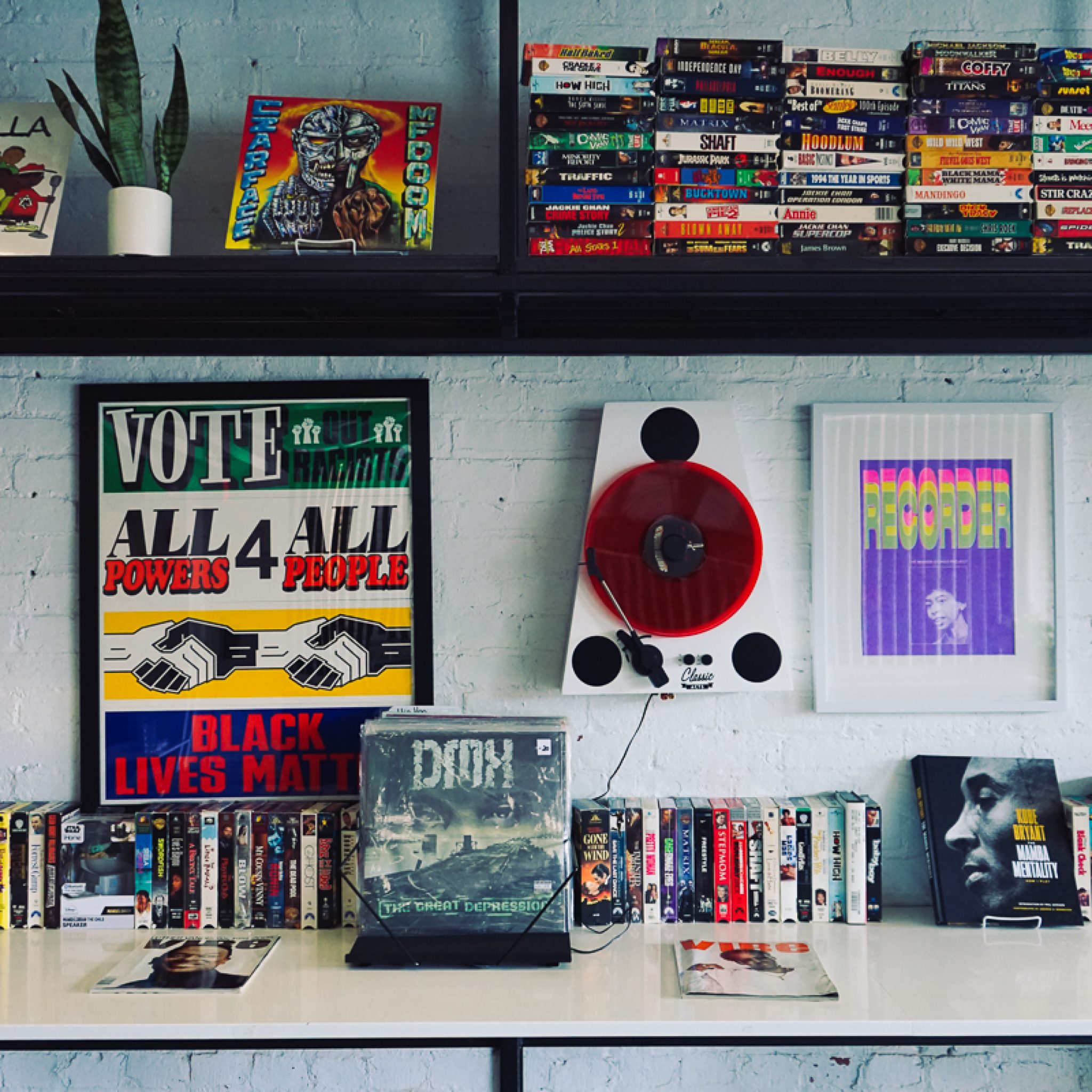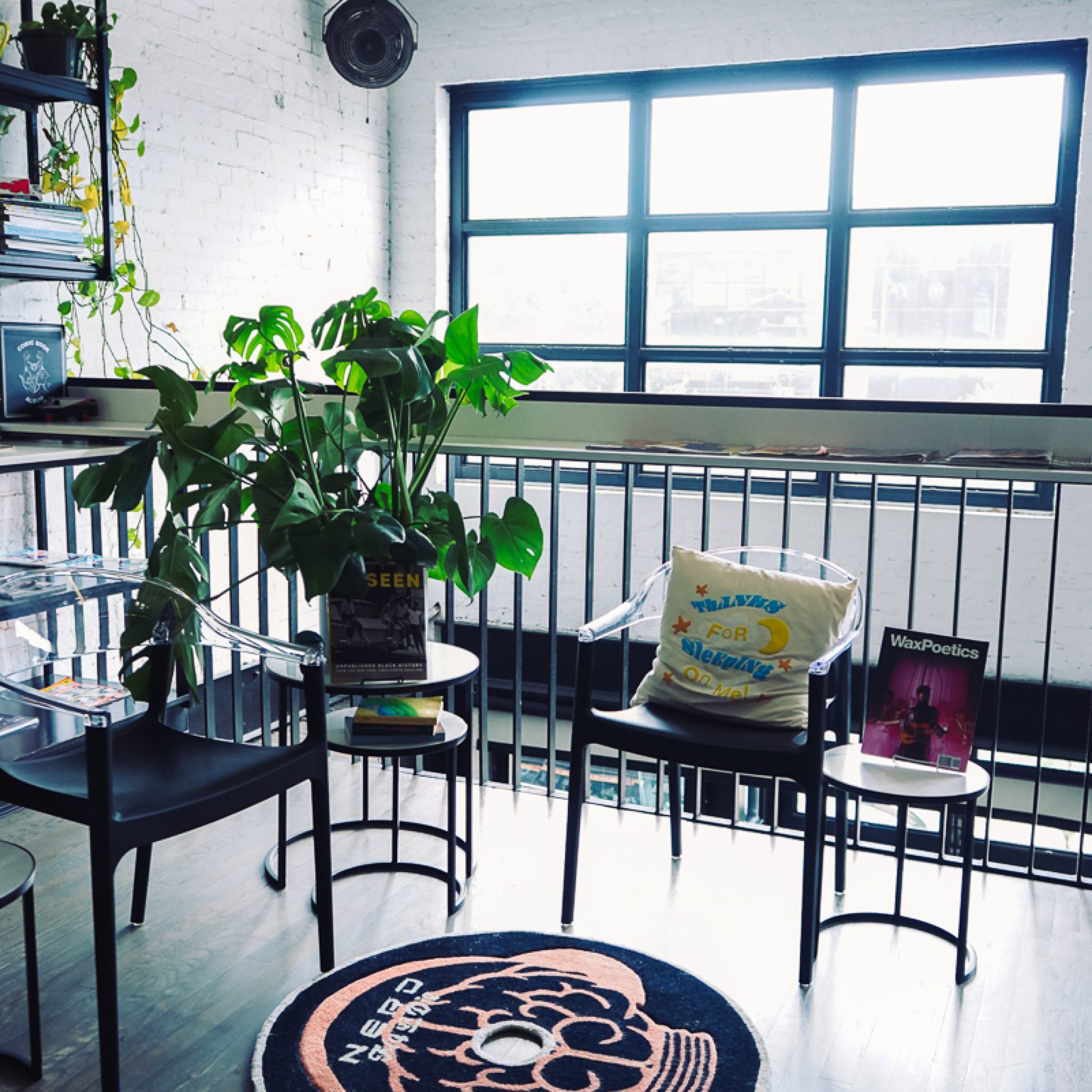“I’m so tired of love songs, tired of love songs, tired of love songs, tired of love…”
I’m way too full to be belting a breezy bop at 10:23pm in a dimly lit restaurant on the southeast side of Washington, D.C. But dinner service is over, the staff discovered it was my birthday eve, and if it violates journalistic integrity to accept the invitation of solo karaoke and a private dance floor, then I don’t want to be right.
Back up: It’s Tuesday, which is experimental supper club night at ABC Pony—“technically an Asian-Italian intersection restaurant on pasta, but you wouldn’t know that because for the last twelve months, we’ve just been serving burgers,” chef-founder Erik Bruner-Yang notes. “We were only open a couple of months before the pandemic, and we’re trying to get back to that point and give [chef] Armani and [general manager] Charles a little opportunity to be creative. You know, remember why they wanted to work in a restaurant in the first place and not a burger joint.”
It’s working, at least for the diner. I bask in the first dish: a single shrimp encased in a fried mochi flour blanket, dipped in a zingy puttanesca sauce, washed down with my gochujang margarita.
In between courses, my eyes parse the technicolor wall in front of me, gloriously lined with VHS tapes predating the aughts. Anderson .Paak raspy raps in the background. I feel crispy, chewy, funky, nostalgic. I feel at ease, apparently ready to let my inner angsty teenager rip.

The ABC Pony crew (from left): Bekka Baltzell (ABC Pony Pastry & Pinsa Chef),
Vina Sananikone (Foreign National Art Director), Mario Almeida (Foreign National Chef De Cuisine)
Opened in December 2019, ABC Pony is one of many siblings in Bruner-Yang’s concept development group Foreign National. In marketing speak, Foreign National is a demand generation engine, creating and cultivating taste for what was previously unknown or nonexistent. Their concepts might sound at home in New York City or Los Angeles or Tokyo—cultural capitals synonymous with the hip and happening—but not in D.C. The U.S. capital’s culinary heritage rides on lawyer-to-lobbyist power lunches over filet mignon, not designer-to-artist kickbacks over mochi shrimp.
Bruner-Yang’s no stranger to pushing past culinary norms. He first made culinary waves in 2011 through late night hit Toki Underground, the first popular ramen restaurant in D.C. After raising $1.7 million and spending two years in development, he opened Maketto in 2015: a three-level space housing a Taiwanese-Cambodian restaurant, specialty café, streetwear and vinyl retail, and mural-adorned courtyard.
It attracted Bekka Baltzell, now the Pastry & Pinsa Chef at ABC Pony, who discovered Maketto through pre-opening press: “It was going to be like an Asian street food stall concept. It sounded amazing. I didn’t have a lot of experience under my culinary belt yet but I thought it sounded dope, so I told my dad one day, even though I knew zero things about Asian food, I was going to work there. [My dad] had worked in Japan for NASA a few years before and we were excited.”

From the outside: Maketto’s courtyard.
While exciting in theory, the business of changing taste is hard. Maketto was one of the first restaurants in the city to serve whole fish—and debone it at the table for you if requested (which they started doing automatically after most did indeed ask).
“Maketto is at this point where it’s very, very hard to do anything new because we’ve been around for so long. People have their favorites and freak out when we take something off the menu and put something new. So when we took that fish off, it was like a fucking mutiny. And then we finally put it back on, but all the fish customers were gone. [Erik laughs.]”
It’s the constant tension for restaurants that serve food outside the bounds of the traditional American diet: the need to not only feed people, but educate them in the process. Education invariably takes labor, which the industry is also notoriously short on, from the server picking up stray fish bones to the marketer posting fish glamour shots.
“I try to teach that everything we do has to be able to be monetized, whether we’re making a dollar or we’re going to spend a dollar to create brand value. What we do is business as much as it is art.”
— Erik Bruner-Yang, founder of Foreign National
Yet when it comes to marketing, Bruner-Yang stands firm. He’s protective of IP, choosing to develop all aspects of brand marketing in-house rather than outsourcing to agencies. Even with Covid-downsizing their corporate staff from twelve to four people—including art director Vina Sananikone, who stayed on board to cover graphic design, photography, and the social media identities across six food, hospitality, and retail concepts—it’s paid off. Menu items, partnership news, and staff shenanigans hit different (read: refreshingly cohesive) when there’s a consistent voice making the announcements.
Even with strong storytelling, staying afloat as a restaurant requires rigorous business savvy. As a business owner for fourteen years, Bruner-Yang’s been through enough failures to intuit this: “I try to teach that everything we do has to be able to be monetized, whether we’re making a dollar or we’re going to spend a dollar to create brand value. What we do is business as much as it is art.”
It’s uncommon to find a James Beard Award-finalist chef who speaks this way. This is the language of digital ad culture and splashy millennial-forward product brands, not the usual chef narrative declaring a love for feeding people and expressing personal creativity. Foreign National feeds people too, but it leads with the brand and business around it.

Reggie Elliott (Foreign National Coffee Director) finishing a latte with microfoam.

This ethos is the hidden engine that’s sustained the group through an earth and industry-shattering pandemic. While it runs on deep culinary impulses, Foreign National is ultimately a “concept development and restaurant implementation group.” It partners with venture-backed startups to source community investments. It takes on international hospitality consulting work to fuel its own brand entities. It’s a scaled model of the independent creative, retrofitting its own ideas of food, hospitality, editorial, and retail businesses.
Bruner-Yang respects the lessons from his consulting clients: “Sometimes you’ve got to do the corporate stuff, and there’s nothing wrong with it, you know? It’s very important for a living. I learn a lot from all my corporate clients, like how to communicate across teams, read P&Ls and run a business. Those places are really good spaces for that.”

The spread (clockwise from left) Sourdough Scallion Pancake, Iced latte,
Cambodian Noodle Salad, Cappuccino, Crispy Chicken Wings,
Those spaces likely sharpened up his instincts for finding a corporate partner to fuel his Power of 10 Initiative—a nonprofit created in response to an industry in Covid crisis, with the goal of providing a restaurant $10,000 a week, creating 10 full-time jobs and providing 1,000 free meals to its direct community. Sponsored by financial juggernaut Capital One, it’s taken over press around Bruner-Yang since the pandemic hit.
“Those first couple of weeks of the pandemic felt like I lost my whole life’s work overnight. Now I’m just grateful for everything that’s left. Like, the sense of drive and ambition that I used to have has definitely dissipated. Everything I want to do, I’ve already created. So anything beyond that would just be pure ego, to be like, look how many restaurants I have, which seems kind of pointless. If I wanted to have gotten rich, I should have opened twenty Toki Undergrounds and called it a day. But everything we do has to have some sort of impact and legacy, and a bunch of ramen shops across the city wouldn’t do that.”


Maketto’s downstairs streetwear retail space.
Bruner-Yang is 38 now, a decade or two older than the crowds his spaces attract, with that much more time to think critically about legacy. He’s married with three kids, living in the same historically tumultuous and culturally rich neighborhood that Maketto’s located in.
But he’s also been young. Bruner-Yang started in music, an industry adjacent to food and familiar with its hustle. He and friends from Mary Washington University in Fredericksburg, Virginia formed indie band Pash in 2002, playing together for eight years before disbanding.
Even after performing at acclaimed Austin music festival South by Southwest, they didn’t gain enough traction to sustainably continue. That kickstarted Bruner-Yang’s transition into food, where he began as the manager of restaurant Sticky Rice, on the same street that he would later open Toki Underground and Maketto on.
For a creative spirit, your dependent-free twenties are the best time to start a traveling band with a precarious roof over your head. With less on the line, failure is an act of grace, a transition out of a devastatingly beautiful time that didn’t end up working the way you wanted. Yet you must try again, in tribute to past and future memory. While the avenue and medium might be different, the heart and hope are the same.

The many faces of Maketto: the upstairs incudes Cool Kid’s Vinyl and a specialty café.
In a growth-oriented world that fetishizes failure, celebratory stories of the rise-up often mask the pain in the process. Losses, for Bruner-Yang —starting with his band, then leaving Toki Underground due to a rift with his investors — were the stepping stones of creative satisfaction, rather than fuel for insatiable hunger in a world of cultural excess.
With numerous failures and successes under his belt, Bruner-Yang’s sober-minded about the road ahead: “So now it’s just really about enjoying the moment. I’m healthy and there’s still some things standing. And whenever I get that next spark, we’ll figure out what that is. But for a while, I felt like I created this machine that was dictating my life, that got broken down because of the pandemic. And now, I feel like I have a little bit more control, whereas before, the work was just so consuming. Now, I want to be able to spend time with my kids and nurture them and give them some stability.”
Bruner-Yang knows the strain of incessant transition, a shapelessness of identity formed through his own childhood. “Growing up [across Taiwan, Tokyo, and Virginia] was tough for me,” he notes. He holds an innate hesitance towards glossy media labels and PR catchphrases. He’s not a Belgian-Taiwanese multi-hyphenate chef; he’s Erik.
He prefers to speak implicitly, as in Maketto’s interior design: “The inspiration for the concept was like, go to a place that was South Asian but had no Asian aesthetics. But you could tell that in its soul, it was Asian. We don’t have dragons painted anywhere or fucking hipster lucky cats or anything like that.”



“Everything I want to do, I’ve already created. So anything beyond that would just be pure ego, to be like, ‘look how many restaurants I have, ‘which seems kind of pointless.
If I wanted to have gotten rich, I should have opened twenty Toki Undergrounds and called it a day. But everything we do has to have some sort of impact and legacy, and a bunch of ramen shops across the city wouldn’t do that.”
— Erik Bruner-Yang, founder of Foreign National
Foreign National’s quiet confidence in its physicality stands out in a world filled with digitally native brands, even if it’s the world they trade in. They’re slow to create online shops for their retail spaces—doing so only through business necessity. They’d rather engineer physical spaces for spontaneity and wandering.
At ABC Pony, I wasn’t just physically satiated by night’s end; I was creatively satisfied—and spiritually free enough to bare my bad karaoke voice in front of strangers-turned-overnight-friends.
Earlier that night at the restaurant, I ran into my café manager from my stint as a barista in D.C. five years prior. He’d brought Korean rice wine for the staff, sourced from Brooklyn-based Hana Makgeolli (which I’d unrelatedly been itching to try). Invited to share in his gift, I felt touched and incredulous at the chance meeting.
Bruner-Yang doesn’t dwell on describing impact and legacy at length. After all, how do you describe the magical alchemy of hospitality?
How do you describe the experience of lounging after dinner service, pleasantly buzzed, listening to the staff workshop the night’s operational workflow? Of turning off the burners, recoiling the keyboard cables? Wiping down the counters, slinging the guitar over your shoulder? Bantering after an exhilarating, exhausting night, and ever ready to do it again the next day? Or not, if a pandemic or tsunami hits. Either way, knowing you put on a good show and humming the last line as you walk out, satisfied.
“Just wanna go home, wanna go home, wanna go home, woooah.”

Mezcal manhattan

ABC Pony, dinner time

Mochi shrimp & puttanesca, gochujang margarita




























